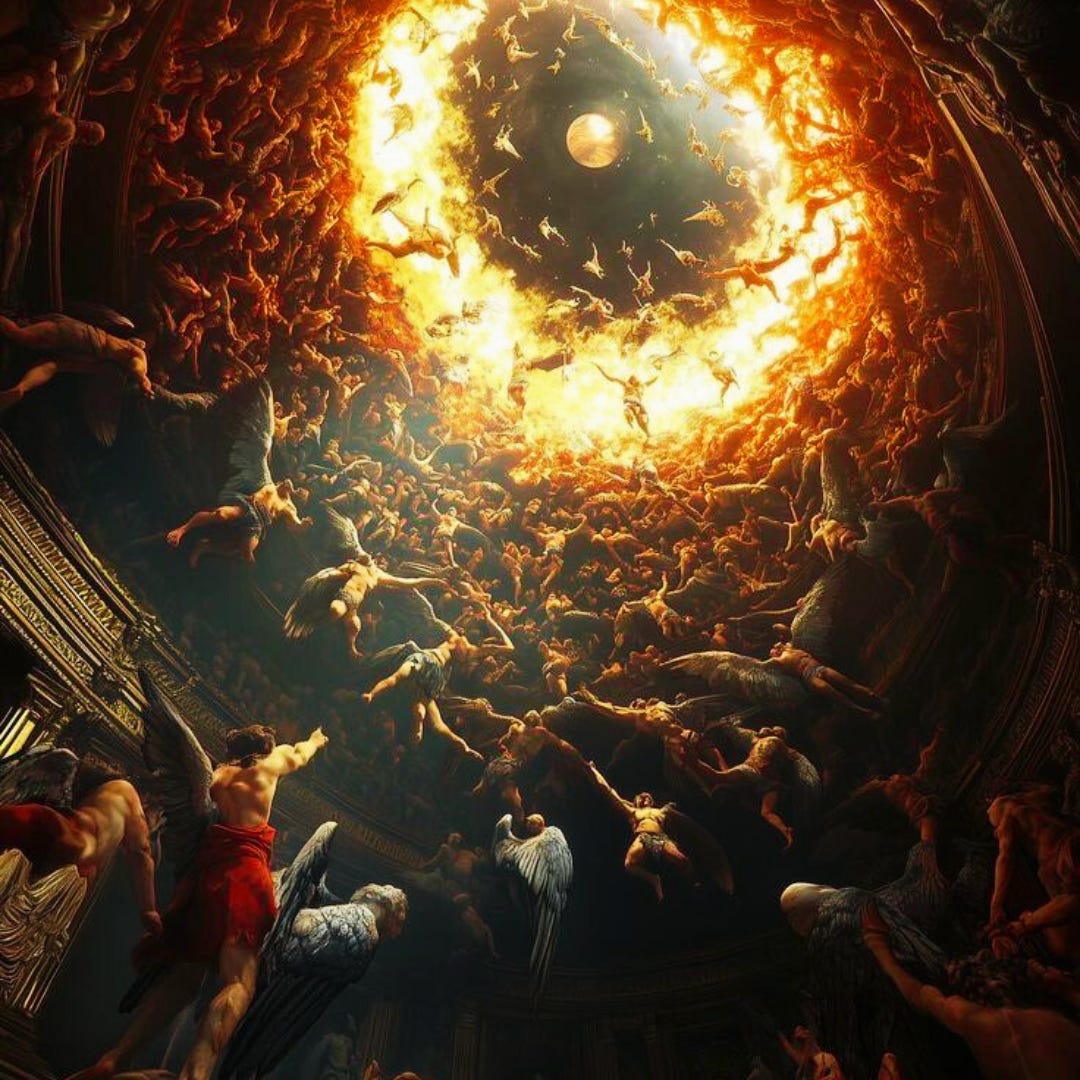Everyone's Religious
The Definition of "Religion" Atheists Hate
Religion is integral to humanity. Your beliefs and how you react to them are inseparable. Your entire life is driven by thought and reaction.
Yet many will bend themselves into pretzels trying to understand what religion is. Some think they know, but when they think deeper, they quickly learn religion is more complex than realized.
Put simply, religion is worldview put into practice.
An atheist vocalized to me his hatred of this definition. He thought it didn’t go far enough and tried to get me to look up typical definitions of religion.
Thing is, I’m a graduate of religious studies from a liberal arts university. I’ve heard every definition of religion in the books, and that’s where I got the definition above: “Religion is worldview put into practice.”
It came from years of thinking over the complexities scholars, both conservative and liberal, saw in the term. In every proposed definition, there were two elements that stood out and continue to do so today: worldview and practice.
Here’s what you need to know about my definition of religion and why it’s a hill worth dying on.
Worldview is Destiny
Everyone has a worldview. It is the collection of beliefs and preconceptions one uses to interpret reality. No matter how much one might try to avoid having a worldview, such lenses are inescapable.
The wise man accepts this and keeps his worldview open to reshaping. Instead of attempting to do away with worldview, he considers available evidence and subjects his worldview to rigorous testing and re-testing.
If his worldview seems inadequate, he changes it to align with his findings. He does so repeatedly, even if that means discarding elements of his worldview he adores and hates parting with.
The practices one performs under his worldview (the choices he makes, his rites and rituals of worship) form his religion. And just like everyone has a worldview, everyone also has practices they perform in servitude to that worldview.
So…everyone is religious.
The Divinity Mistake
Atheists refuse to call religion “worldview put into practice” for several reasons.
One is because they falsely assume religion must involve a deity or the supernatural. But that’s not the case. There are plenty of examples of religion not involving gods or the supernatural.
Here are 3 primary world religions from history fitting this bill:
Buddhism
The central tenets of Buddhism are about escaping the world. One sheds off earthly existence to escape suffering and find peace. The result is merging with the eternal energy or Nirvana, also known as “enlightenment.”
No gods are involved. In fact, Buddhism suggests that true enlightenment transcends the supernatural, as in the Hindu gods and religion.
Confucianism
Confucius constructed an honor cult. He argued Heaven is sacred moral principle, not supernatural, and one attains Heaven by practicing the 5 virtues: sincerity, wisdom, propriety, righteousness, and benevolence.
Taoism
Adherents of Taoism sought to unite themselves with the Tao, which was defined as an endless state of flux underlying reality, similar to Buddhist Nirvana. The world and universe in Taoism are a relative and random illusion.
One becomes united with the Tao through meditation, astrology, qijong, feng shui, and internal alchemy. Cultivating the self and the Tao, and longing for harmony were highly valued.
These examples all exclude the supernatural from their religion, yet people and scholars consider them among the chief religions of the ancient East, demonstrating religion does not require gods or the supernatural.
Just One Among Many
Another reason atheists refuse to accept religion as “worldview put into practice” is most of them think they are the elite arbiters of reason. They pretend to hold a monopoly on factual knowledge. To be considered a religion would, in their minds, link them to delusion.
Atheists, from this vantage, are immersed in an illusion of power they refuse to relinquish. Like Dorian Grey, they obsess over their feigned superiority, while suppressing the truth. And whenever challenged, instead of actually dealing with the content of any proposed objections against their worldview, their immediate reaction is to consider their opponents stupid or less educated.
The atheist who told me my definition of religion isn’t complex enough is a case in point. He wanted me to “educate myself.”
Not only is that disrespectful, derogatory, and demeaning; it’s also what’s known as an ad hominem, attacking the person rather than the argument. A logical fallacy modern atheists enjoy immensely. But what’s worse, atheists ARE NOT the arbiters of factual knowledge.
Philosophy and theology are where all other modes of knowledge originated. Factual knowledge began as a belief. People tested it logically with data, they regularly retested it, and at every level the findings had to be interpreted.
Worldview leads to religion leads to knowledge. The best explanation for reality is whatever best aligns with logic and reason and properly interprets all available data, and atheism has to live up to that standard if it’s true.
Defining religion as “worldview put into practice” forces atheists to look at their portrait and deal with their poor choices.
Denial
Pure and utter denial is another reason atheists don’t enjoy defining religion as “worldview put into practice.”
I encountered an example of such denial recently. An atheist said this:
“The important difference is that my ‘lack of belief in god’ is not the foundation of my worldview in the way that your belief might be for yours. Many Christians don’t seem to understand this. It’s just a thing I don’t believe, it’s not the anchor of how I see life”
The argument presented in this quote is quite common. Atheists honestly think they just “lack belief in gods.” But their negative “lack of belief in gods” is actually the positive belief that humans made up all gods and the material universe is all that exists.
There are no real atheists. Only materialists, or naturalists as philosophers call them.
Since every negative is the opposite of a positive, everyone needs to prove every claim beyond a reasonable doubt to consider it factual knowledge. There is no getting around a claim by stating, “It’s just a lack” or “You can’t prove a negative.”
The atheist above doesn’t understand how his own positive belief that the gods are made up and the material universe is all there is affects every single decision he makes. His interpretation of reality determines how he operates just as much as every other human on the planet.
He lives based on what he believes. Ergo, he is practicing his worldview, making it his religion.
Nihilism
The last major reason atheists won’t acknowledge religion as worldview put into practice is because deep down they know there are serious flaws with their materialist worldview.
Materialism taken to its honest end leads to nihilism, the belief that nothing matters and when we die, that’s it. Poof. Gone.
The effects of nihilism are hopelessness and depression from lack of purpose and mission. Nihilism has eroded and destroyed more lives than any other belief on the planet because it is amoral. If nihilism is true, then anything goes. It’s an every-man-for-himself world.
Most atheists realize if materialism is true and leads to nihilism, then one of them must be false because of how horrific an end nihilism is. So, they take one of two routes:
Steal from God
Many adopt Christian morals and then claim a materialist world produced them through millions of years of human communal evolution.
Problem is, humans throughout the ages have never aligned on anything. Certain cultures think it is good to eat other humans (still today), rape and pillage, and do any other number of heinous acts. And from a communal evolutionary perspective, if those acts work for those societies, then those acts are “good.” So communal evolution is a very poor explanation for morality.
Also, “good” and “bad” are nouns, nominative, meaning they are objects, and that is the case in every language. If they are objects, what are they? What specifically is being described?
Every offer from atheism to answer those questions has come up wanting.
Just the Brute Facts, Bro
Prominent atheists like Friedrich Nietzsche and Richard Dawkins have taken this road by claiming that materialism and evolution are just brute facts, and you have to get over it.
Nietzsche was honest that nihilism is the end product of atheism, and it abhorred him. But he didn’t want God to exist, so he refused to recant from atheism.
Dawkins is also honest about nihilism, but he tries to play both hands. For him, atheism is true. But it’s also true that society needs Christianity and its moral principles to function and thrive.
In other words, Christianity isn’t true, but it IS good, if that makes any sense.
There’s another factor to consider with point 2. “Just the facts, bro” is exactly the same as a Christians saying, “The Bible says it, so I believe it.”
Neither route taken provides any solid ground for atheism to stand on. Defense of the atheist position is merely deflected and/or dodged, while materialism and evolution are clung to as gospel.
And by stealing from God or saying, “It’s just the facts, bro,” atheists only prove that they follow a faith-based position. A religion.
Conclusion: Top of the Hill
Religion is worldview put into practice. That definition stands strong because it best incorporates all faith-based systems and their practitioners, is simple, and holds up to scrutiny.
As seen, objections to the definition have been offered from emotion and not by reason. Atheists don’t want religion to be worldview put into practice because then they can’t escape being grouped in with other religions and will be forced to admit they have no monopoly on factual knowledge. And admit that they are human interpreters just like everyone else.
Accepting the definition would also mean they must grasp with the deficiencies of their own position and provide adequate defenses in order to claim it true. They would rather mock and deride opponents, cancel them, or force them to defend their own positions while pretending atheism is self-evident or “just a lack of belief.”
Nevertheless, they have a worldview: the view that the gods are made up and the material universe is all that exists. And they live their lives according to their worldview (unless they steal from God). This means they are religious, whether they like it or not. And they must abide by the same standards of testing claims as all other faith-systems. Otherwise, they should never be taken seriously.








